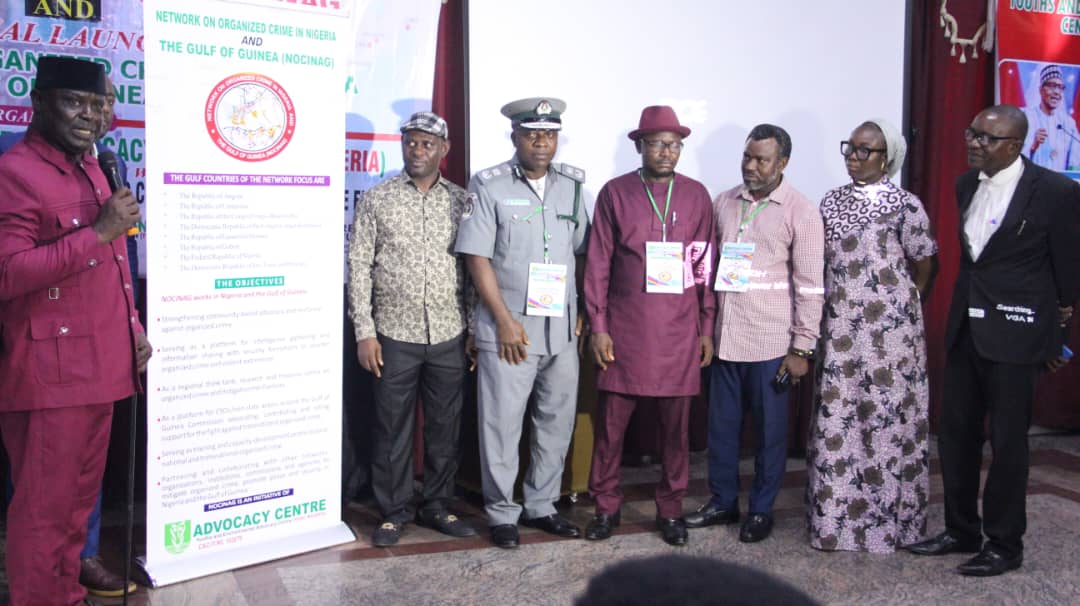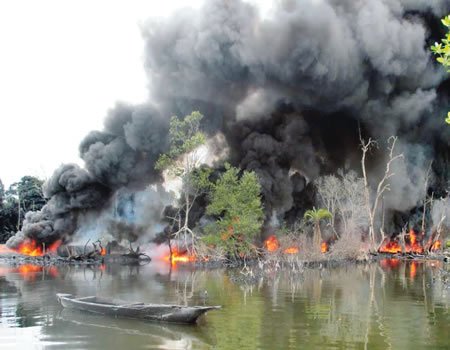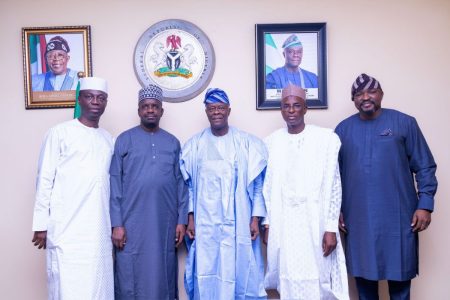
– To mitigate organized crimes
– Buhari affirms Nigeria’s commitment to tackling crime in GoG
Mkpoikana Udoma
Port Harcourt — President Muhammadu Buhari has announced that Nigeria remains committed to spearheading the efforts in tackling crimes in the Gulf of Guinea.
The President in his message at the National Conference on Organized Crimes in Nigeria and the Gulf of Guinea, via his verified Twitter handle, recalled that in 2019 he assented to Suppression of Piracy and Other Maritime Offences Act (SPOMO Act), which according to him was to curb Piracy, Armed Robbery and other unlawful acts against any ship lawfully operating in the Gulf of Guinea.
President Buhari who was billed to launch the “Network on Organised Crime in Nigeria and the Gulf of Guinea” at the Conference organised by the Youths and Environmental Advocacy Centre (YEAC-Nigeria) in Port Harcourt, noted that his administration recently, invested $195 million in security boats, vehicles and aircraft.
“I’m pleased with the successes being recorded in tackling piracy in the Gulf of Guinea. Nigeria remains committed to spearheading these efforts. Through the Deep Blue Project, launched in June 2021, Nigeria invested $195 million in security boats, vehicles and aircraft.”
Earlier, stakeholders at the conference urged President Muhammadu Buhari, to issue the 18 modular refinery licenses already approved for Akwa-Ibom, Bayelsa, Delta, Cross River, Edo and Rivers states, before leaving office in May, as a way of mitigating organized crimes in Nigeria and the Gulf of Guinea.
Also, the stakeholders charged the Federal Government to reach out to its counterparts in the Gulf of Guinea and immediately establish a Taskforce Against Organized Crime in Nigeria and the Gulf of Guinea.
Speaking, Executive Director of YEAC-Nigeria, Mr. Fyneface Dumnamene Fyneface, urged the federal Government to make real all its promises to the youths and people of the Niger Delta that can help mitigate organized crimes in the Gulf of Guinea.
Fyneface said instead of pipeline surveillance contracts, the government should provide alternative livelihood opportunities for those displaced by the war against artisanal refining, regretting that organized crime thrives since security agencies who are supposed to stop It, are involved, aiding, abetting and refusing to do their job.
“Issue the 18 Modular refinery licenses already approved for Akwa-Ibom, Bayelsa, Delta, Cross River, Edo and Rivers states. I hereby reiterate the call for Ondo, Abia, and Imo States where pipeline vandalism, artisanal refining and associated environmental pollution is also on-going to be included among the states to be issued three modular refinery licenses each to mitigate the on-going organized crime.
“Government should establish Presidential Artisanal Crude Oil Refining Development Initiative (PACORDI) for illegal artisanal refiners in the Niger Delta the same way it established Presidential Artisanal Gold Mining Development Initiative (PAGMI) for illegal gold miners in parts of the north and western Nigeria.
“I call on security operatives posted to the Niger Delta to stop getting involved, aiding and abetting pipeline vandalism, crude oil theft, illegal bunkering and artisanal refining that destroys our environment.
“I call on Nigerian Maritime Administration and Safety Agency (NIMASA), Ministry of Transportation, the Presidential Amnesty Programme and other relevant Ministries, departments and agencies of government to implement in full, the communiqué issued at the end of the Global Maritime Security Conference in Abuja in 2019.
“I call on the Gulf of Guinea Commission to strengthen its efforts in the coordination of member states and synergizing with non-state actors especially under the auspices of Network on Organized Crime in Nigeria and the Gulf of Guinea (NOCINAG) in the fight against organized crime in the region.
“I call on the Federal Government of Nigeria to reach out to its counterparts in the Gulf of Guinea and immediately establish a “Taskforce Against Organized Crime in Nigeria and the Gulf of Guinea (TAOCING)”
Delivering the keynote address, the Head, Department of Political and Administrative Studies,
University of Port Harcourt, Prof Fidelis Allen, said there was urgent need for the government to commit itself to combating organized crime due to its scale, transnational nature, low resilience of countries, vulnerability of innocent people, and the impact it has on general security and development.
“There is a need to expand the policy community that does not depend on state actors alone to drive change. Crime continues to be framed as a policy problem because addressing it effectively has proven challenging for countries.
Many countries facing this challenge in the Gulf of Guinea region at the same time are struggling with the problem of violent conflict domestically. They are also struggling with the challenge of corruption and poverty.
The transnational nature of many of the crimes committed in these countries also suggests how difficult it could be to successfully address the problem without regional or transnational cooperation between policy communities.
“In the Niger Delta, analyses have consistently pointed accusing fingers at local and international partners in the large-scale stealing of crude oil. There is collaboration between foreign vessel owners and Nigerians at various levels of official and unofficial authority to steal oil.”
Also, the Executive Director of Kebetkache Women Development and Resource Centre, Chief Emem Okon, speaking on the Impact of Organized Crimes on Women, regretted that women and the girlchild were the most victims of organized crimes.
“Women are mostly the victims of human trafficking, kidnapping, prostitution, etc and also, women are at the receiving end of illegal oil bunkering. Whenever there is explosion from adulterated fuel or kerosene, the casualties are usually women.”
Follow us on twitter



